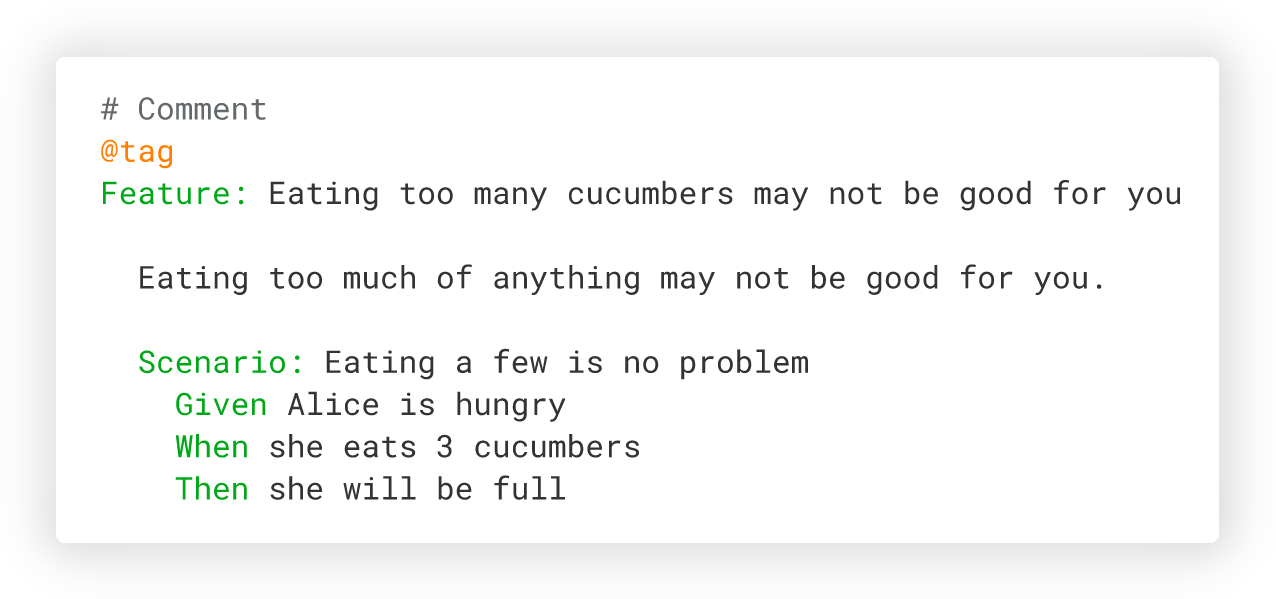Cucumber is a tool for running automated tests written in plain language. Because they're written in plain language, they can be read by anyone on your team. Because they can be read by anyone, you can use them to help improve communication, collaboration and trust on your team.
This is the Ruby implementation of Cucumber. Cucumber is also available for JavaScript, Java, and a lot of other languages. You can find a list of implementations here: https://cucumber.io/docs/installation/.
See CONTRIBUTING.md for info on contributing to Cucumber (issues, PRs, etc.).
Everyone interacting in this codebase and issue tracker is expected to follow the Cucumber code of conduct.
Cucumber for Ruby is a Ruby gem. Install it as you would install any gem: add
cucumber to your Gemfile:
gem 'cucumber'
then install it:
$ bundle
or install the gem directly:
$ gem install cucumber
Later in this document, bundler is considered being used so all commands are using
bundle exec. If this is not the case for you, execute cucumber directly, without
bundle exec.
- Ruby 3.1
- Ruby 3.0
- Ruby 2.7
- Ruby 2.6
- TruffleRuby 22.0.0+
- JRuby (with some limitations)
- 9.3 >= 9.3.1 (there is a known issue with JRuby 9.3.0. More info can be found in the PR#1571.)
Using Ruby on Rails? You can use cucumber-rails to bring Cucumber into your Rails project.
If you need to, initialize your features directory with
$ bundle exec cucumber --init
This will create the following directories and files if they do not exist already:
features
├── step_definitions
└── support
└── env.rb
Create a file named rule.feature in the features directory with:
# features/rule.feature
Feature: Rule Sample
Rule: This is a rule
Example: A passing example
Given this will pass
When I do an action
Then some results should be there
Example: A failing example
Given this will fail
When I do an action
Then some results should be there
And a file named steps.rb in features/step_definitions with:
# features/step_definitions/steps.rb
Given("this will pass") do
@this_will_pass = true
end
Given("this will fail") do
@this_will_pass = false
end
When("I do an action") do
end
Then("some results should be there") do
expect(@this_will_pass)
end$ bundle exec cucumber
To execute a single feature file:
$ bundle exec cucumber features/rule.feature
To execute a single example, indicates the line of the name of the example:
$ bundle exec cucumber features/rule.feature:7
To summarize the results on the standard output, and writte a HTML report on disk:
$ bundle exec cucumber --format summary --format html --out report.html
For more command line options
$ bundle exec cucumber --help
You can also find documentation on the command line possibilities in features/docs/cli.
- Getting started, writing features, step definitions, and more: https://cucumber.io/docs
- Ruby API Documentation: http://www.rubydoc.info/github/cucumber/cucumber-ruby/
- Community support forum: https://community.smartbear.com/t5/Cucumber-Open/bd-p/CucumberOS
- Slack: register for an account then head over to #intro
Copyright (c) Cucumber Ltd. and Contributors. See LICENSE for details.

